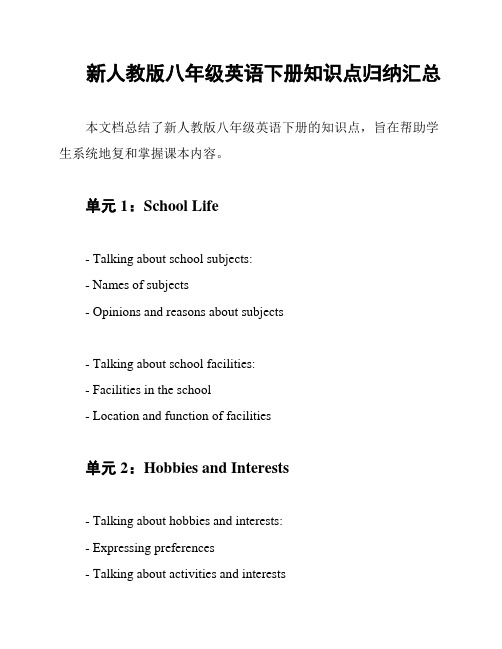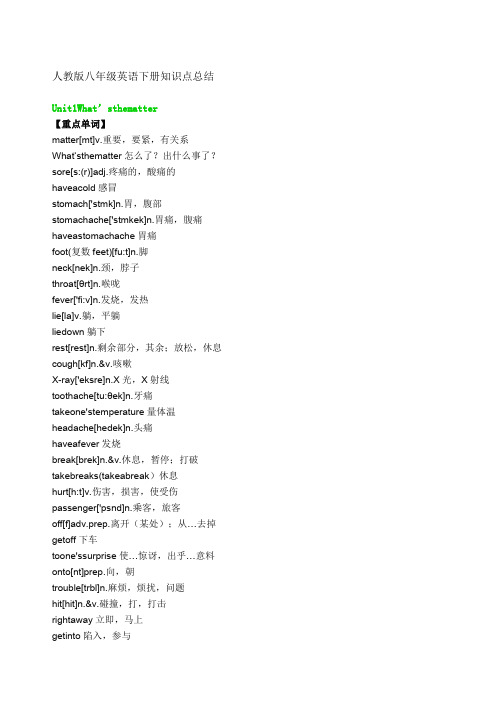人教版最新八年级英语下册知识点全
八年级下册人教版英语笔记

八年级下册人教版英语笔记一、Unit 1 What's the matter?1. 重点单词。
- matter:n. 问题;事情。
常用搭配:What's the matter (with sb.)? = What's wrong (with sb.)? = What's the trouble (with sb.)?(某人)怎么了?- sore:adj. 疼痛的;酸痛的。
例如:a sore throat喉咙痛。
- stomachache:n. 胃痛;腹痛。
- foot:n. 脚;足。
复数形式是feet。
- neck:n. 脖子;颈部。
- fever:n. 发烧。
have a fever发烧。
- lie:v. (lay - lain)躺;平躺。
lie down躺下。
- rest:v. & n. 放松;休息。
take breaks/take a break = have a rest休息。
- cough:v. & n. 咳嗽。
have a cough咳嗽。
- toothache:n. 牙痛。
2. 重点短语。
- have a cold:感冒。
- have a stomachache:胃痛。
- lie down and rest:躺下休息。
- drink some hot tea with honey:喝些加蜂蜜的热茶。
- see a dentist:看牙医。
- get an X - ray:拍X光片。
- take one's temperature:量体温。
3. 重点句型。
- What should I do? 我应该做什么?- You should see a dentist and get an X - ray. 你应该去看牙医并拍X光片。
- Should I put some medicine on it? 我应该在上面敷些药吗?- Yes, you should. / No, you shouldn't. 是的,你应该。
新人教版八年级英语下册知识点归纳汇总

新人教版八年级英语下册知识点归纳汇总本文档总结了新人教版八年级英语下册的知识点,旨在帮助学生系统地复和掌握课本内容。
单元1:School Life- Talking about school subjects:- Names of subjects- Opinions and reasons about subjects- Talking about school facilities:- Facilities in the school- Location and function of facilities单元2:Hobbies and Interests- Talking about hobbies and interests:- Expressing preferences- Talking about activities and interests- Talking about free time:- Discussing how free time is spent- Making plans for free time单元3:Finding A Job- Talking about future jobs:- Discussing future careers- Describing job responsibilities- Talking about skills and qualities:- Describing skills and qualities for different jobs - Discussing personal skills and qualities单元4:Healthy Living- Talking about health and lifestyle:- Discussing healthy habits- Talking about exercise and diet- Talking about illnesses and symptoms: - Giving advice for staying healthy单元5:Going Shopping- Talking about shopping:- Discussing preferences for shopping - Describing shopping experiences- Talking about money:- Discussing prices and quantities单元6:Visiting Places- Talking about places:- Describing famous places- Talking about tourist attractions- Talking about travel plans:- Making travel arrangements- Talking about past travel experiences单元7:Festivals and Celebrations- Talking about festivals and celebrations:- Describing traditional festivals- Talking about cultural celebrations- Talking about activities and traditions:- Describing activities during festivals- Explaining traditions and customs单元8:Environment- Talking about environmental issues:- Discussing environmental problems- Giving suggestions for protecting the environment - Talking about actions and measures:- Describing actions to save the environment- Discussing personal contributions to the environment以上是新人教版八年级英语下册的知识点归纳汇总。
最新人教版八年级英语下册第一单元知识点汇总

最新人教版八年级英语下册第一单元知识点汇总Unit 1 What’s the matter?一、基础知识1.我感冒了。
可以表达为I had a cold、catch a cold或have the flu。
have a fever表示发烧,have a cough表示咳嗽,have a stomachache或肚子疼表示胃疼,have a toothache表示牙疼,have a headache表示头疼。
2.将身体部位和ache(疼痛)结合起来构成新的复合词,如stomach+ache=stomachache,head+ache=headache,tooth+ache=toothache,back+ache=backache,表示相应的疼痛。
3.“怎么啦?出什么事情了?”可以表达为What’ s the matter。
也可以用What’ s the trouble with you?或What’ s wrong with you。
matter和trouble为名词,其前可加the或形容词性物主代词,而wrong是形容词不能加the。
用于询问某人有什么病或遇到什么麻烦、问题,其后跟询问对象时,与介词with连用,如What’s the matter with sb。
= What’s your trouble?= What’s up?= What happens to sb。
举例来说,当问到“What’s the matter with you?”时,回答可以是“I have a bad cold.”4.maybe表示“或许”,常用于句首,表示可能性,后加句子。
例如Maybe you are right。
may be是情态动词+be的结构,意为“可能,也许”,后加名词、代词或形容词。
例如He maybe angry。
sound like可以和名词、代词以及从句结合使用,如It sounds like you don’t know the truth.It sounds like a good idea。
人教版八年级英语下册知识点总结

人教版八年级英语下册知识点总结Unit1What’sthematter【重点单词】matter[mt]v.重要,要紧,有关系What’sthematter怎么了?出什么事了?sore[s:(r)]adj.疼痛的,酸痛的haveacold感冒stomach['stmk]n.胃,腹部stomachache['stmkek]n.胃痛,腹痛haveastomachache胃痛foot(复数feet)[fu:t]n.脚neck[nek]n.颈,脖子throat[θrt]n.喉咙fever['fi:v]n.发烧,发热lie[la]v.躺,平躺liedown躺下rest[rest]n.剩余部分,其余;放松,休息cough[kf]n.&v.咳嗽X-ray['eksre]n.X光,X射线toothache[tu:θek]n.牙痛takeone'stemperature量体温headache[hedek]n.头痛haveafever发烧break[brek]n.&v.休息,暂停;打破takebreaks(takeabreak)休息hurt[h:t]v.伤害,损害,使受伤passenger['psnd]n.乘客,旅客off[f]adv.prep.离开(某处);从…去掉getoff下车toone'ssurprise使…惊讶,出乎…意料onto[nt]prep.向,朝trouble[trbl]n.麻烦,烦扰,问题hit[hit]n.&v.碰撞,打,打击rightaway立即,马上getinto陷入,参与herself[h:self]pron.她自己,她本身(she的反身代词)bandage['bndd]n.&v.绷带;用绷带包扎sick[sk]adj.患病的,不适的knee[ni:]n.膝盖nosebleed[nzbli:d]n.鼻出血breathe[bri:e]v.呼吸sunburned[snb:nd]adj.晒伤的ourselves[ɑ:selvz]pron.我们自己(we的反身代词)climber[klam(r)]n.登山者beusedto习惯于…适应于…risk[rsk]n.&v.风险,危险;冒险takerisks(takearisk)冒险accident[ksidnt]n.意外事件;事故situation[sitjuein]n.状况,形式,情况kg=kilogram[klgrm]n.公斤,千克rock[rk]n.岩石runout(of)用尽,耗尽knife[naif]n.刀,餐刀cutoff切除blood[bld]n.血mean[mi:n]v.意味着,意思是,意欲getoutof离开,从…出来importance[mp:tns]n.重要性decision[d'sn]n.决心,决定,抉择control[kn'trl]v.控制,支配,操纵beincontrolof掌管,管理spirit['sprt]n.勇气,意志death[deθ]n.死亡giveup放弃nurse[n:s]n.护士【重点短语】1.haveafever发烧2.haveacough咳嗽3.haveatoothache牙疼4.talktoomuch说得太多5.drinkenoughwater喝足够的水6.haveacold受凉;感冒7.haveastomachache胃疼8.haveasoreback背疼9.haveasorethroat喉咙痛10.takerisks冒险11.hotteawithhoney加蜂蜜的热茶12.seeadentist看牙医13.getanX-ray拍X光片14.takeone’stemperature量体温15.putsomemedicineonsth.在……上面敷药16.giveup放弃17.soundlike听起来像18.allweekend整个周末19.inthesameway以同样的方式20.gotoadoctor看医生21.goalong沿着……走22.onthesideoftheroad在马路边23.shoutforhelp大声呼救24.withoutthinkingtwice没有多想25.getoff下车26.haveaheartproblem有心脏病27.toone’ssurprise另某人惊讶的是28.thanksto多亏了;由于29.intime及时30.makeadecision做出决定31.getintotrouble造成麻烦32.rightaway立刻;马上33.becauseof由于34.getoutof离开;从……出来35.keepondoingsth.继续或坚持做某事36.putabandageonsth.用绷带包扎37.falldown摔倒38.feelsick感到恶心39.haveanosebleed流鼻血40.cuthisknee割伤他的膝盖41.putherheadback把她的头向后仰42.haveproblemsbreathing呼吸困难43.mountainclimbing登山运动44.beusedtodoingsth.习惯做某事45.runout(of)用完;用尽46.sothat以便47.so...that...如此……以至于...…48.beincontrolof掌管;管理49.inadifficultsituation在闲境中【重点句型】1.What'sthematterwithyou=What'thetroublewithyou=What'swrongwithyou你怎么了?2.Whatshouldshedo她该怎么办呢?3.ShouldItakemytemperature我应该量一下体温吗?4.Youshouldliedownandrest.你应该躺下休息一会儿。
(完整版)最新人教版八年级下册英语全册知识点大全

最新人教版八年级下册英语全册知识点大全Unit 1重点短语:have a stomachache have a cold lie downtake one’s temperature have a fever go to a doctorto one’s surprise agree to (do sth.)get into troublebe used to take risks run out (of)cut off get out of be in control ofkeep on ( doing sth.)give up语言知识归纳:1. What’s the matter (w ith you)?此句用来询问别人的病情。
类似的句子还有:What’s wrong with you?/ What’s the trouble?matter作动词用,意为“要紧”“有关系”,主要用于疑问句和否定句。
What does it matter? It doesn’t matter.【例题】Does it ________ if we can’t finish it today?A. mindB. mindsC. matterD. matters2. I have a sore throat.have “患病”,常用“have a /an+ 名词”.have a cold have a fever have a sore backhave a stomachache have a cough【例题】( )---Does he often have ______ cold? ---Yes. He also _____a cough and a sore throat.A. a; hasB. /; hasC. a; haveD. /; have3.Lie down and rest! 躺下休息lie down 躺下4.That’s probably why. 那可能就是原因。
新版人教版八年级下英语语法重点归纳(全)

新版人教版八年级下英语语法重点归纳(全)一、名词名词是指用来表示人、事物、地方、动物等的名称的词语。
名词分为可数名词和不可数名词。
可数名词有单数和复数两种形式,而不可数名词只有单数形式。
- 可数名词:表示单数时,名词前面通常有冠词a/an或者其它数量词进行修饰;表示复数时,名词通常要在词尾加“s”。
- 不可数名词:不可数名词表示的是无法分为个体的物体、概念、抽象事物等,通常不能用于复数形式。
二、动词动词表示人或物的动作、行为、状态或存在的词语。
动词分为及物动词和不及物动词。
- 及物动词:及物动词后面可以直接接宾语,表示动作的承受者或影响对象。
- 不及物动词:不及物动词不能直接接宾语,它可以后面接副词或介词短语,表示动作发生的方式、状态等。
三、形容词形容词是用来描述名词性词语的词语。
它可以表示人或物的性质、状态、特征、颜色等。
- 形容词可以修饰名词,放在名词的前面。
- 形容词还可以通过加后缀“-er”和“-est”来比较级和最高级。
四、副词副词是用来修饰动词、形容词和其他副词的词语。
副词可以表示时间、地点、方式、程度、频率等。
- 副词在句中通常位于动词、形容词或者其他副词的前面。
- 副词的比较级和最高级可以通过在前面加上more和most来表示。
五、代词代词是用来代替名词或名词性的词语的词语。
代词可以分为人称代词、指示代词、疑问代词、不定代词等。
- 人称代词表示人的身份或人称,包括主格和宾格两种形式。
- 指示代词用来指示特定的人或物,可以表示近处的、远处的或已提到的事物。
- 疑问代词用于提问,通常用来询问人或事物的身份、性质、数量等信息。
- 不定代词用来指代不特定或泛指的人或物,表示数量或程度。
六、冠词冠词是位于名词前面用来修饰名词的词语。
冠词分为定冠词和不定冠词。
- 定冠词指特指某一具体的人或事物,有两种形式:定冠词“The”用于表示特定的人或物,而不定冠词“A/An”用于泛指任意的人或物。
七、介词介词是用来表示人或物之间关系的词语。
人教版八年级英语下册各知识点归纳总结(最新最全)

人教版八年级英语下册各知识点归纳总结Unti1 what’s the matter?短语归纳1.too much 太多2.lie down 躺下3.get an X-ray 做个X光检查4.take one ’s temperature 量体温5.put some medicine on ......在....上敷药6.have a fever 发烧7.take breaks /take a break 休息 8.without thinking twice 没多想9.get off 下车 10.take sb to the hospital 送某人去医院11.wait for等待 12.to one’s surprise 使.......惊讶的13.thanks to多亏于;由于 14.in time及时15.think about 考虑 16.have a heart problem患有心脏病用法归纳1.need to do sth .需要去做某事2.see sb doing sth 看见某人正在做某事3.ask sb sth 询问某人某事4.expect sb to do sth 期望某人做某事5.agree to do sth 同意做某事6.help sb (to) do sth 帮助某人做某事7.want to do sth 想要做某事 8.tell sb to do sth 告诉某人做某事9.have problems(in) doing sth 做某事有困难 e sth to do sth用某物去做某事语法点1.询问某人的健康问题及遇到麻烦的表达方法2.情态动词should的用法3.不定代词的用法精细解读1. What’s the matter (with you)? 怎么了?出什么事了?What’s the trouble/ the problem / wrong with sb./ sth.?2. I had a cold.我感冒了。
人教版八年级英语下册各单元知识点总结完整版

Unit 1 What’s the matter?一、重点短语1. have a fever 发烧2. have a cough 咳嗽3. have a toothache 牙疼4. talk too much 说得太多5. drink enough water 喝足够的水6. have a cold 受凉;感冒7. have a stomachache 胃疼8. have a sore back 背疼9. have a sore throat 喉咙痛10. lie down and rest躺下来休息11. hot tea with honey加蜂蜜的热茶12. see a dentist看牙医13. get an X-ray拍X光片14. take one’ s temperature量体温15. put some medicine on sth在……上面敷药16. feel very hot 感到很热17. sound like 听起来像18. all weekend 整个周末19. in the same way以同样的方式20. go to a doctor 看医生21. go along 沿着……走22. on the side of the road 在马路边23. shout for help 大声呼救24. without thinking twice 没有多想25. get off 下车26. have a heart problem 有心脏病27. to one’ s surprise 使……惊讶的28. thanks to 多亏了;由于29. in time及时30. save a life 挽救生命31. get into trouble 造成麻烦32. right away 立刻;马上33. because of 由于34. get out of 离开35. hurt oneself 受伤36. put a bandage on sth. 用绷带包扎37. fall down 摔倒38. feel sick 感到恶心39. have a nosebleed 流鼻血40. cut his knee割伤他的膝盖41. put her head back 把她的头向后仰42.have problems breathing呼吸困难43. mountain climbing登山运动44. be used to doing sth. 习惯做某事45. run out (of) 用完;用尽46. so that 以便47. so…that 如此……以至于……48. be in control of 掌管;管理49. in a difficult situation 在逆境屮50. keep on doing sth.坚持做某事51. make a decision做出决定52. take risks 冒险53. give up 放弃二、知识点解析1. What’s the matter? 怎么了?若是询问“某人怎么了?”要用“What’s the matter with sb.?”拓展:What’s the matter with sb.? 的同义句:What’s wrong with sb.? / What’s the trouble with sb.?2.疾病类短语:have a +疾病. e.g. :have a fever 发烧have a cold 感冒have a cough 咳嗽.have a +身体部位-ache. e.g.: have a headache 头痛have a toothache 牙痛.have a sore+身体部位. e.g.: have a sore throat咽喉痛have a sore back背痛例题:Mom, I____________.I’m sorry to hear that, dear. We must go to see the dentist right away.A. have a headacheB. have a stomachacheC. have a toothacheD. have a fever3. lie down 躺下V. 躺,平躺。
- 1、下载文档前请自行甄别文档内容的完整性,平台不提供额外的编辑、内容补充、找答案等附加服务。
- 2、"仅部分预览"的文档,不可在线预览部分如存在完整性等问题,可反馈申请退款(可完整预览的文档不适用该条件!)。
- 3、如文档侵犯您的权益,请联系客服反馈,我们会尽快为您处理(人工客服工作时间:9:00-18:30)。
人教版最新八年级英语下册知识点全总结!Unit1 what' s the matter?1. It’s +形容词+ for sb. + to do sth.做某事对某人来说是…的。
It’s important to do sth.做某事很重要。
It’s important for me to eat a balanced diet.平衡饮食对我来说是很重要的.It’s easy to do sth.做某事是容易的。
It’s easy for us to find out the answer.找出答案对我们来说是容易的。
2.情态动词should的用法should是情态动词,它的基本用法是必须和其他动词一起构成谓语。
意为"应该......"。
should(应当,应该)用于所有人称,表示劝告或建议。
eg. ---I have a very bad cold.我感冒很厉害。
---You should lie down and have a rest.你应该躺下,多喝水。
3. maybe与may be(1)maybe是副词,译为“也许、可能”,相当于“perhaps”。
如:Maybe he can answer the question.也许他能回答那个问题。
He maybe is from the USA, too.他可能也来自美国。
(2)may be中的may为情态动词,译为“可能是......”。
如:He may be from the USA, too.他可能也来自美国。
She may be our English teacher.她可能是我们的英语老师。
4. few、a few、little、a little的区别和联系:(1)few / a few用来修饰可数名词,few表示否定意义,没有,几乎没有;a few表示肯定意义,有几个。
例如:He has few friends here, he feels lonely.他这里没朋友,他感觉寂寞。
There are a few eggs in the basket.篮子里有几个鸡蛋。
(2)little / a little用来修饰不可数名词,little表示否定意义,没有,几乎没有;a little 表示肯定意义,有一点儿。
例如:There is little ink in my bottle. Can you give me a little ink?我的瓶子里没有墨水了,你能给我点儿墨水吗?5. not…until 直到…(否定句)才......,动词为短暂性或瞬间性动词。
She didn’t leave until we came.He went shopping after he got up.=He didn’t go shopping until /before he got up....until/till直到......(肯定句)动词为延续性动词We stayed here till/until 12 o’clock.Unit2 I'll help clean the city parks.1.短语动词小结常见动词短语结构有下面几种:(1)动词+副词如:give up 放弃;turn off 关掉;stay up 熬夜这种结构有时相当于及物动词,如果其宾语是代词,就必须放在动词和副词之间,如果是名词,则既可插在动词和副词之间,也可放在短语动词后。
(2)动词+介词如:listen of 听;look at 看;belong to 属于这种结构相当于及物动词,后面跟宾语。
run out of 用完,耗尽(4)动词+名词+介词如:take part in参加;catch hold of 抓住2. each每个,各自的,强调事物的个别情况,常与of 连用every 每个,每一个的,一切的,有“全体”的意思不能与of 连用3. help sb. (to) do帮助某人做某事help him (to) studyhelp sb. with sth.帮助某人做某事help him with Englishhelp do 帮助做某事help study4. spend...doing...花费…做…I spent a day visiting Beijing.我花了一天的时间去参观北京。
spend…on sth.花费…在…I spent 3 years on English.5. join参加(指参加团体、组织)如:join the Party 入党take part in 参加(指参加活动)如:take part in sports meeting 参加运动会6. run out与run out ofHis money soon ran out.他的钱很快就花光了。
Our time is running out.我们剩下的时间不多了。
(2)run out of 主语为人,表示主动含义。
He is always running out of money before pay day.他总是在发工资的日子还没有到就把钱花完了。
两者在一定条件下可以互换如:The petrol is running out.汽油快用完了= We are running out of petrol.Our time is running out.我们剩下的时间不多了。
= We are running out of time.7. work out(1)结局,结果为The strategies that he came up with worked out fine.他提出的这个策略效果很好。
(2)算出,制订出,消耗完(精力等)He never seems to be worked out.他好像永远不会疲乏似的。
He worked out a plan.他制订了一个计划。
I have worked out our total expenses.我已经算出了我们总的费用。
8. hang out闲荡闲逛I like to hang out at mall with my friends.我喜欢和我的朋友一起去购物中心闲荡。
9. be able to do能,会be unable to do 不能,不会10. for sure确实如此,毫无疑问You don’t have money. That’s for sure.你没有钱,这是毫无疑问的。
11. fill… with…使…充满…用…填充…She filled the bowl with water.她用水填满碗。
12. hand out分发hand out bananasgive out 分发give out sth to sb.分….给某人give up doing 放弃… give up smoking 放弃吸烟give away 赠送捐赠give away money to kidsgive sb. sth.给某人某东西give me money 给我钱give sth. to sb.给某人某东西give money to me 给我线13. help sb. out帮助…做事,解决难题(摆脱困境)I can’t work out this math problem. Please help me out.我不能算出这道数学问题,请你帮我解决。
14. train n.火车v.训练train sb. to do.训练某人做某事She trains her dog to fetch things.她训练她的狗去取东西。
15. at once == right away立刻马上如:Do it at once.马上去做。
I’ll go there at once/ right away.我马上去那里。
16. one day有一天(指将来/过去)some day 有一天(指将来)如:One day I went to Beijing.有一天我去了北京。
Some day I’ll go to Beijing.有一天我将去北京。
Unit3 Could you please clean your room?1.关于to 的短语总结have to do sth.不得不/必须做某事need to do sth.需要做某事hate to do sth.讨厌做某事like to do sth.喜欢做某事want to do sth.想做某事love to do sth.热爱做某事forget to do sth.忘记做某事start to do sth.开始做某事begin to do sth.开始做某事ask sb to do sth.请某人做某事2. ---Could you please clean your room?---Yes, sure. / Sorry, I can't. I have to do my homework first.---Could I please use the car?---Sure. / Certainly. / Of course. / No, you can't. I have to go out.在表示请求帮助或请求允许的疑问句中,常用could 代替can,以表示礼貌,委婉或不确定的语气,而can 则不具备这些语气。
这种情况下不能把could 看作can 的过去式。
以上两句中用could 是为了表示礼貌的请求。
表示请求帮助或请求允许时,除了can, could 之外,还可以用may,句子的表达方式也各有不同,可以用不同的方式来表示同一个概念。
例:Could / Can / May I use your car for a day?作允答可以各种各样:如同意可以说Yes,或Sure 或Certainly,还可说Yes, (do) please.或Of course. (you may / can).或That's OK / all right.如果不同意,可以说I'm sorry you can't.或I'm really sorry, but I have to use it today.要避免说No, you can't.这样显得很不礼貌。
否定回答通常用委婉语气。
Unit4 Why don’t you talk to your parents?1. get( 1 )买get sth. for sb. = get sb. sth.为某人买某物Can you get some fruit for me when you go shopping ?= Can you get me some fruit when you go shopping ?( 2 )得到,到达Where did you get the book?When did you get the letter?He got home late last night.(3)使,让,get +宾语+宾补使某人/某物怎么样Please get you coat clean.Get your mouth closed.get sb. to do sth.使某人做某事I got him to call Jim yesterday.(4)(逐渐)变得…...The weather gets warmer and days get longer .Why did the teacher get angry ?2. how about/ what about后跟名词/代词/动词ing形式。
